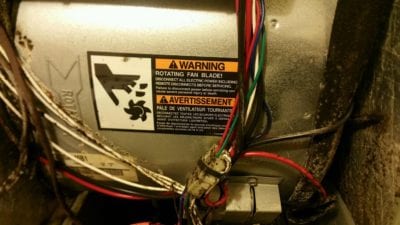What If I’m Told I Have Mold in Air Conditioner or Furnace?
Updated on 07/02/2019
Mold in your air conditioner is very prevalent in homes, but diagnosing it and determining if its harmful can only be done by experts.
It’s common to find mold in your air conditioner or furnace. Your furnace and evaporator coil have all the components necessary for things like mold to develop. Primarily because there’s consistent moisture. Even if you have your furnace and air conditioner maintained every year, the process of heating and cooling your home necessarily creates condensation that doesn’t completely go away.
Couple that with the areas of moisture being hard to reach, and you have an environment where mold can and does develop.
How Do You Check for Mold in Air Conditioner?
Mold Inside Air Conditioning Evaporator Coil
Mold Inside Furnace
Homesense on the Radio
I was asked my opinion about this issue on a recent Today’s Homeowner with Danny Lipford radio show, which is a nationally syndicated weekly radio program. A caller had a 5 year old home and had an HVAC tech tell him that he had mold, and recommend two possible solutions to the problem.
Listen here at minute 30:00 for the full answer. But, like I said above, the basic feedback was “are you sure it’s mold?” and “are you sure this will resolve the issue?”
What We Take Issue With
As you can probably tell from the radio show, I have a problem with a technician who performed no test on the substance and claimed no certification on the matter, declaring what the substance was and that he had the solution available. Until a proper diagnosis is performed, don’t pay for an expensive solution.
If you notice or have a home service provider notice something that appears to have mold-like qualities, there are specific procedures you should follow.
- Is the person qualified to determine the substance? Homesense isn’t (i.e. the earlier reference in staying in our lane) and most likely your home service provider isn’t either.
- If you’re concerned the substance could be harmful to your health, find a provider who is qualified.
How to Find an Expert
In Indiana, like most states, there is no requirement to act like a mold expert. The policing on something like this is limited, so you have to be your own advocated. We recommend checking to ensure an hvac company or individual is IICRC Certified.
What the Experts Say
According to the EPA, the key to controlling mold is controlling moisture. And while there’s no way to rid your home of all of the over 200,000 types of mold spores that have been identified, moisture control can help limit the fuel it needs to grow.
Here’s the Ten Things you should know about Mold according to the EPA:
1) Potential health effects and symptoms associated with mold exposures include allergic reactions, asthma and other respiratory complaints.
2) There is no practical way to eliminate all mold and mold spores in the indoor environment; the way to control indoor mold growth is to control moisture.
3) If mold is a problem in your home or school, you must clean up the mold and eliminate sources of moisture.
4) Fix the source of the water problem or leak to prevent mold growth.
5) Reduce indoor humidity (to 30-60%) to decrease mold growth by:
- Venting bathrooms, dryers and other moisture-generating sources to the outside
- Using air conditioners and de-humidifiers
- Increasing ventilation
- Using exhaust fans whenever cooking, dishwashing and cleaning
6) Clean and dry any damp or wet building materials and furnishings within 24-48 hours to prevent mold growth.
7) Clean mold off hard surfaces with water and detergent, and dry completely. Absorbent materials such as ceiling tiles, that are moldy, may need to be replaced.
8) Prevent condensation: Reduce the potential for condensation on cold surfaces (i.e., windows, piping, exterior walls, roof, or floors) by adding insulation.
9) In areas where there is a perpetual moisture problem, do not install carpeting (i.e., by drinking fountains, by classroom sinks, or on concrete floors with leaks or frequent condensation).
10) Molds can be found almost anywhere; they can grow on virtually any substance, providing moisture is present. There are molds that can grow on wood, paper, carpet, and foods.
Still not sure what to do?
As always, we’re available to walk through what you’re dealing with. Feel free to contact us to assist with your issue.
Join Our Indianapolis HVAC Preventative Maintenance Program

